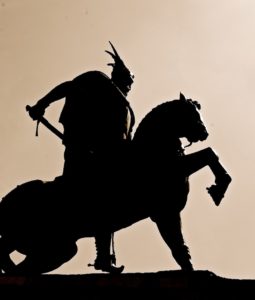
When listening to, say, your local business partner, people sitting at busy cafés, or impromptu markets on street corners speak, be aware of the precious heritage surrounding you. Intangible yet substance-filled, present-day Albanian features scores of millennia-old words, tracing back to civilizations that are now confined to pavilions of antiquities. A priceless living vestige of the archaic past of the Mediterranean and beyond, as revealed by emergent literature on linguistics, it shares profound and profuse affinities with some of our planet’s most ancient tongues, including Sanskrit, Persian, Hebrew, Akkadian, Hittite, Greek, Latin and the oldest branches of German.
Indeed, the many archeological artifacts and linguistic relics that bear witness to a glorious past for this corner of Europe, speak of a cultural and spiritual hub, and a “melting pot” of the mythological lore of remote ages. After all, notwithstanding disputes on the exact location, these territories hosted the prominent Dodona oracle, drawing visitors from all corners of the globe long before the Hellenic, Latin, and eventually, Slavic civilizations appeared and thrived in the broader region.
Similar to the handful of Albania’s cultural and historical assets, both tangible and intangible, that have been awarded “UNESCO World Heritage” status – including the 6th century illuminated Gospel manuscript “Codex Purpureus Beratinus”, the iso-polyphonic music performed by Labs and Tosks of Southern Albania, the citadel of Gjirokastra, the 2,400-year old town of Berat, and the ancient city of Butrint, inhabited since pre-historic times and described in Virgil’s Aeneid as a “Troy in miniature” – the Albanian language represents yet another invaluable treasure that has been preserved for the world. A meaningful contribution to the European “puzzle” of cultures and languages, modern Albanian provides an interpretation key not only to long-standing linguistic enigmas but also to the historiography of the ancient Mediterranean in its entirety.
Certainly, the country’s uneven, often rugged geography has played a role in its preservation, providing a natural shield from the random ravages of rising and declining empires throughout the course of time. It is the remarkable resilience and vitality of the Albanian people though, that ultimately allowed the spoken language to be passed on to successive generations, turning it into an essential component of Albania’s national sentiment and core identity. And most likely, these very qualities will guarantee its longevity for centuries to come.
Since the post-1990 democratic transition, Albania has gradually made its way out of Europe’s “blind spot”. Yet, the country’s splendid heritage – the Albanian language being a prime asset – has yet to be fully cherished by visiting tourists and scholars alike. Taking stock of such amazing legacies will go a long way to ensure that Albania is no longer seen as a backward country in the backyard of Europe, but rather as a gem of immeasurable historical and cultural value for all.